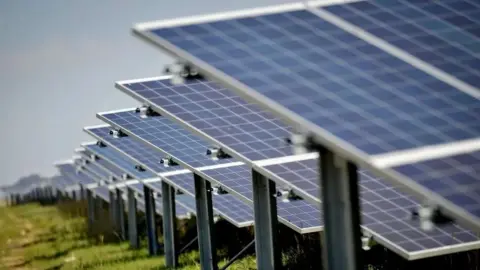Huge solar farm will cause major harm, says council
 BBC
BBCA large-scale solar farm would cause "major harm lasting generations" and should be "dramatically reduced" in size, a council has said.
Botley West Solar Farm would cover about 1,000 hectares (2,471 acres) of countryside at three sites in west Oxfordshire.
In its final written representation to the government, the district council will say the proposals are "detrimental" to the area.
Developer PVDP said it "disagreed" with the local authority and had made several changes to the proposed locations of solar panels.
The project - which would see panels installed in countryside north of Woodstock, west of Kidlington and west of Botley - is considered a Nationally Significant Infrastructure Project.
This means the application must be considered by the government, not local councils.
West Oxfordshire District Council's local impact report, written in conjunction with other local authorities that cover the proposed sites, listed 10 areas that it believes the farm would negatively impact.

These include the historic environment, visual effect on the landscape, noise and vibration and public rights of way.
None of the 17 areas listed were given a potential impact rating of "positive", but seven, including hydrology and flooding, were rated as "neutral".
Speaking at the council's planning meeting on behalf of Stop Botley West, Rosemary Lewis said: "It is vital to have the support of the local council.
"It is good to know here in west Oxfordshire, at least, democracy is alive and well".
However, Witney resident Jonathan Ford urged the council to reverse the verdict of their report.
"What is the issue of our time if not climate change... [the council should] acknowledge the clear truth, that Botley West will aid climate change mitigation."
Developer 'stopped listening'
Speaking to BBC Radio Oxford, council leader Andy Graham said: "If developers listen to the mitigations that could be put in place, we could actually have a win-win."
Mr Graham said he wanted to see the proposed site reduced in size by "at least half".
"I think the developers have stopped listening... I'm a little disappointed that they just didn't continue the dialogue."
However, Mark Owen-Lloyd, director of developer PVDP, denied that his company had not engaged with the council.
"We have consistently bowed to what we've been told and removed panels from [several areas].., I think that's unfair to say we haven't listened," he said.
Mr Owen-Lloyd added that 30% of the total site would be "mitigation, wildflower meadows and community growing".
If approved, PVDP hopes construction of the solar farm will begin in early 2026, with electricity being connected to the National Grid in 2028.
You can follow BBC Oxfordshire on Facebook, X (Twitter), or Instagram.
